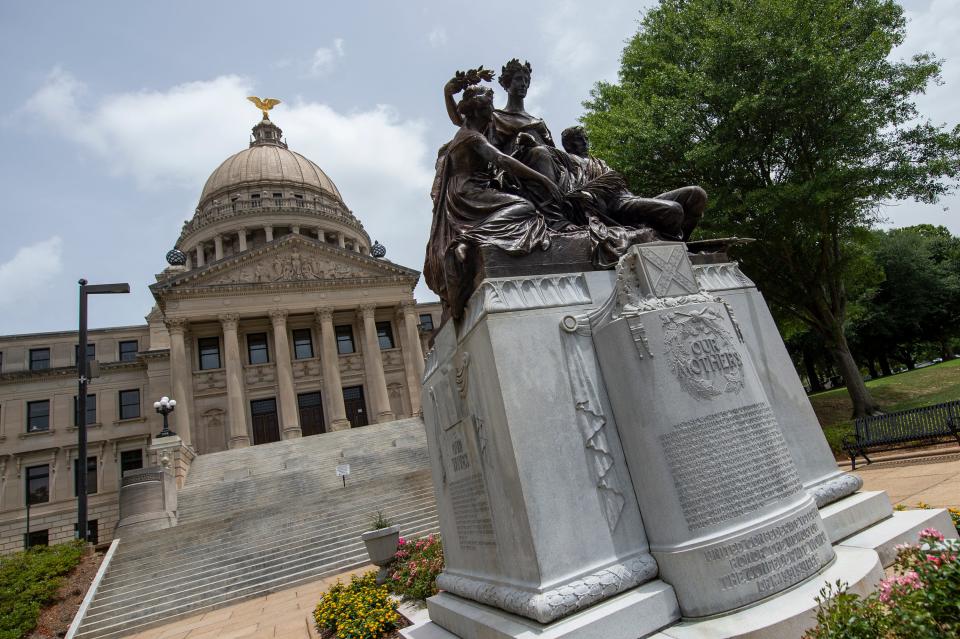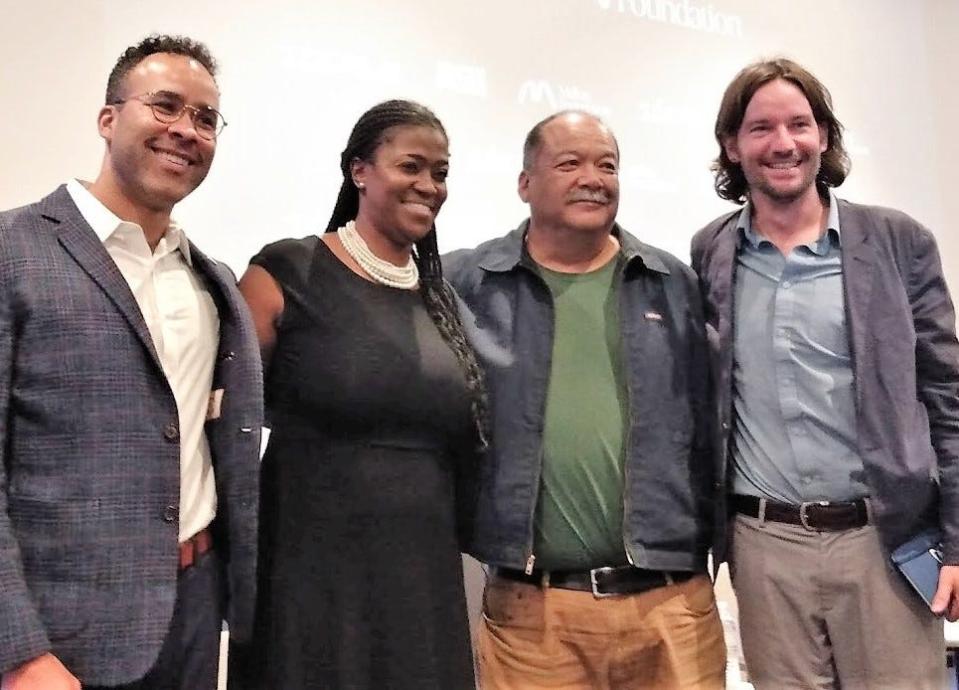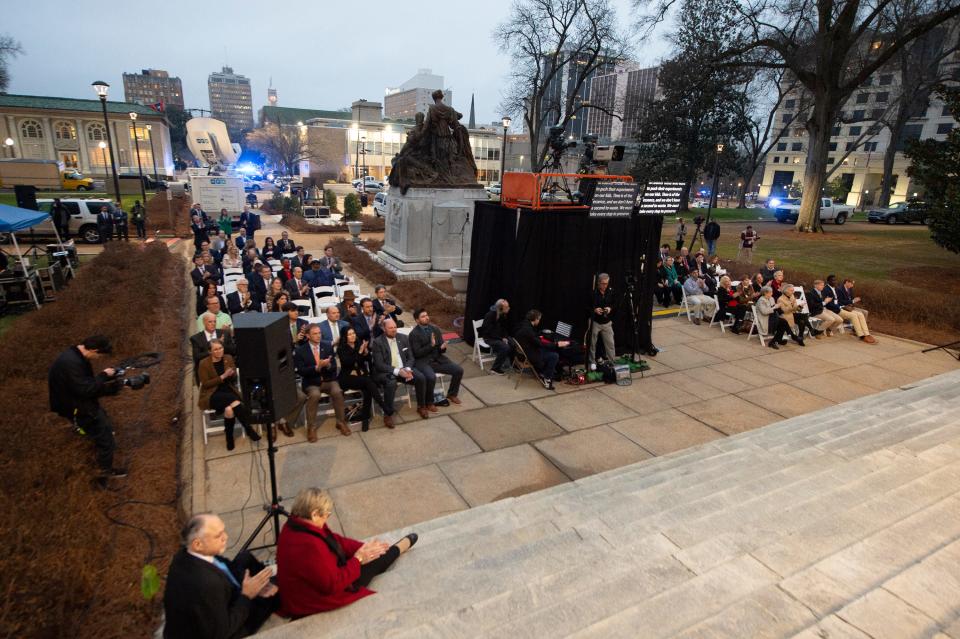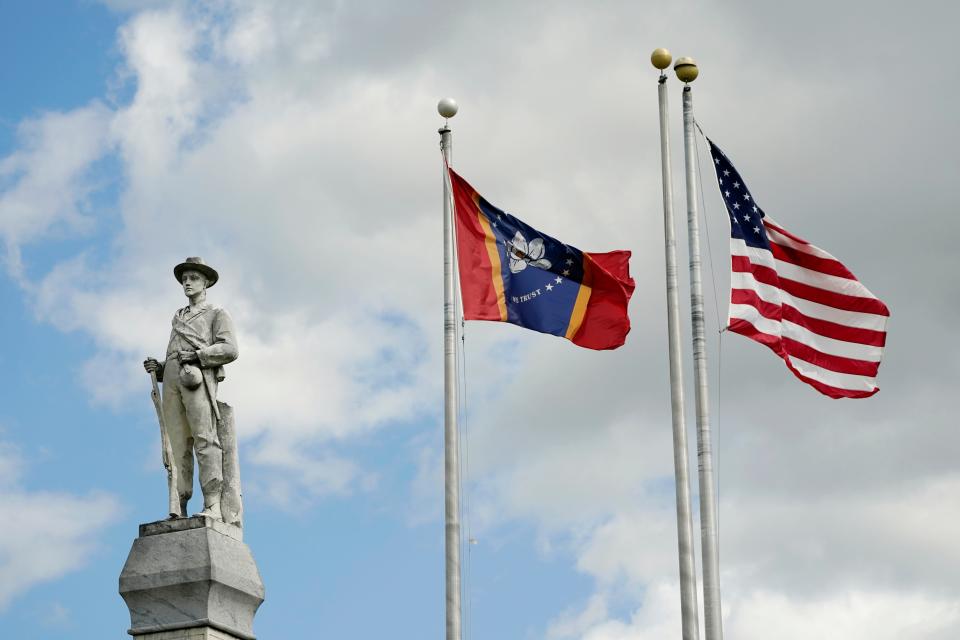Confederate monuments remain 'politically charged' in MS as forum tackles issue
- Oops!Something went wrong.Please try again later.
- Oops!Something went wrong.Please try again later.
The Mississippi state flag has changed, no longer bearing the Confederate battle flag. That doesn't men, however, that symbols of the Confederacy aren't a controversial topic to many across the state.
A event held Thursday evening at Two Museums in Jackson tried to tackle the issue, discussing the symbolism and importance of public monuments in society. Experts called historical monuments, especially in the South, "politically charged."
The panel featured moderator and Hattiesburg author William Sturkey, Daphne Chamberlain, Vice President for Strategic Initiatives and Social Justice at Tougaloo College, Richard Lou, visual and performance artist and chair of the Department of Art at the University of Memphis and Patrick Weems, Executive director of the Emmett Till Interpretive Center in Sumner.
Monuments represent “an emotional and politically charged topic,” Sturkey said. That is particularly true in the South, where thousands of Confederate statues and monuments remain standing. Among the most prominent in Jackson is the Monument to Women of the Confederacy which has stood for more than 100 years at the south entrance to the Mississippi Capitol.

To some southerners these monuments represent a tribute to the struggles of their forebears while to others they represent a glorification of white supremacy and obfuscate the roles of African Americans in history.
“There is a lot of anxiety around truth telling. It becomes a polarizing issue,” Chamberlain said.
Lou recalled encounters during a performance he organized at Nathan Bedford Forrest State Park in Tennessee, named after a Confederate Army General and founder of the Ku Klux Klan.

“There were some sympathizers of Confederate monuments there. One person said General Forrest helped a member of his family,” Lou said. “But to others it is a negation of who we are and who we strive to be. My world view stands in opposition to Nathan Bedford Forrest.”
Weems said these are things “we don’t debate well.”
He noted that when a memorial sign was erected in the Mississippi Delta to honor the life of Emmett Till, a 14-year-old Black boy who was abducted and lynched in 1955, “someone thought that the way to defeat that was to shoot it up — three times.”
Emmett Till accuser dies: Carolyn Bryant Donham, woman at center Emmett Till lynching, dies
Too often difficult topics surrounding race are met with silence, he said. “In the Delta no one mentioned Emmett Till for 50 years,” he said.
Lou said silence about sensitive topics surrounding race and sex have also now become state sanctioned in many places. Pointing to the enacted “Divisive Concepts Law” in Tennessee which “prohibits a public institution of higher education from taking certain actions with regard to divisive concepts,” he said legislators have “demonized” education and educators.
“If you don’t abide by silence you will be silenced economically. It’s past scary,” Lou said.
Such efforts make it even more important to expose young people to history, Chamberlain said. She noted that “Until the lion learns to write his own story the hunter will be glorified.”
Moving the topic along, Sturkey asked the panelists what sorts of monuments they feel deserve to be built and preserved moving into the future.

Chamberlain said what is most important is for all sides of a story to be presented and for young people to be empowered through knowledge. She reflected on the annual pilgrimages in her hometown of Columbus where people come to view stately antebellum homes dating to the Civil War.
“I think of these homes as monuments, but we need to lift up the stories of the people who actually built these homes — the untold stories of the slaves. There are always two sides of the story,” she said.Sturkey noted than in 1860 enslaved people outnumbered whites in Mississippi by 80,000. “It is very important that people know they lived here and were important,” he said.
Weeks said that “the real conversations about this happen in local communities.” He suggested maybe what is needed is not more statues of soldiers or politicians but rather monuments to honor common people. “It takes the best of Mississippi to talk about the worst of Mississippi. We need more stories, not less stories,” he said.
Chamberlain also mentioned the “Tougaloo Nine,” a group of Black students who participated in civil disobedience by staging sit-ins of segregated public institutions in Mississippi in 1961 as one such group worth memorializing.The entire program was streamed live, a recording of which may be found by searching “What Kind of Monuments Do We Deserve?” on Youtube.

This article originally appeared on Mississippi Clarion Ledger: Confederate monuments remain 'politically charged' in Mississippi

